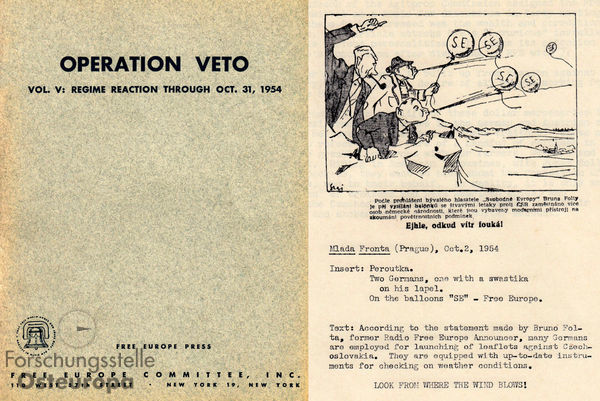Odesa-Tage 2025
Kolloquiumsvortrag
18:15 Uhr, / Zoom
Gun-Britt Kohler (Oldenburg) | Feld, Markt, Ideologie. Der belarussische Literaturbetrieb im ersten Drittel des 20. Jahrhunderts
Conference: Coming to the Surface or Going Underground? Art Practices, Actors, and Lifestyles in the Soviet Union of the 1950s-1970s
Research Centre for East European Studies (FSO)
Registration until 07.11.2025
Wissenswertes
Dialogue and Disillusionment
Operation Veto and Contact across the Iron Curtain in 1950s Central Europe

Replica of a caricature contained in the report of Operation Veto. Archive of the Research Centre for East European Studies. Photo: Karina Garsztecka.
This booklet was produced in 1954, at a moment of non-communication during the Cold War, with the United States having articulated a policy of “diplomatic refusal vis-à-vis the USSR.” But while high-ranking officials studiously avoided dialogue, paradoxically, media outlets allied to their countries engaged in a particularly intense back-and-forth across the Iron Curtain, to which this document attests.
“Operation Veto” was a campaign instigated by the American-sponsored station Radio Free Europe (RFE) to foster what it called a “people’s opposition” in socialist Czechoslovakia. In this booklet, RFE analysts reflected on the results of their most recent initiative: the dispatch of tens of thousands of leaflets from West Germany into Czechoslovakia by balloon. The leaflets, which are partially reproduced here, encouraged farmers to leave their collective farms, suggesting that such kolkhozes were crumbling in other socialist states. They appealed to farmers’ sense of patriotism and productivity, as such agricultural methods necessarily resulted in shortages, they wrote. The fliers also encouraged readers to tune in to RFE and provided tips to make this easier in a country that jammed the station’s broadcasts. Historian Prokop Tomek calls Operation Veto the “most extensive and elaborate” balloon action aimed at Czechoslovakia (which came to an end following the Hungarian revolution in 1956). Such techniques had been used in earlier twentieth-century conflicts and, most recently, had been deployed on the battlefield in Korea, where the US military understood leafleting to be an important tool fostering anti-communism among soldiers and civilians.
Operation Veto – Vol. V, which was given to the archive in Bremen by Tomasz Mianowicz, a Polish editor at RFE, shows how the station gauged the success of their leaflet campaign. It referred to letters from RFE listeners, interviews with recent Czechoslovak emigrants and travelers to the West, and Czech and Slovak radio and newspaper reports. Its authors calculated that “the Communist regime reacted 88 times: 55 times over the radio, 32 times in the press and once by diplomatic note,” thus eliding the Czechoslovak press and the Communist regime.
In fact, journalists were experiencing more professional autonomy in Czechoslovakia at this period, facilitated not least by a dialogue between media across the Iron Curtain. Responding to what their counterparts were doing on the other side of the propaganda divide allowed Czechoslovak professionals to debate what good and bad journalism sounded like. Central to such debates were the contributions of former RFE journalists who had returned to Czechoslovakia. In tightly choreographed press conferences, for example, recent returnee Bruno Folta spoke out vociferously against Operation Veto. His words are cited at length in this booklet. Folta contrasted the “treachery” he had been involved in at RFE to the “honest work” of socialist journalism in Czechoslovakia. Whilst ethical debates granted journalists a stage to codify appropriate professional behavior, these events also sowed disillusionment among audiences. Inadvertently, they showcased voices such as Folta’s, which had first presented one set of viewpoints on RFE, and subsequently quite another on Czechoslovak Radio.
Rosamund Johnston
Further reading
Anna Bischof, Zuzana Jürgens (eds.): Voices of Freedom – Western Interference? 60 Years of Radio Free Europe, Göttingen 2015.
Melissa Feinberg: Curtain of Lies. The Battle over Truth in Stalinist Eastern Europe, New York 2017.
Kevin McDermott: Communist Czechoslovakia, 1945-1989. A Political and Social History, London 2015.
Rosamund Johnston is a historian and journalist. She wrote her dissertation on radio listening and reporting in socialist Czechoslovakia. Her current work as a postdoctoral fellow at the University of Vienna focuses on the global history of socialist Czechoslovakia’s arms trade.
Länder-Analysen
Die Länder-Analysen bieten regelmäßig kompetente Einschätzungen aktueller politischer, wirtschaftlicher, sozialer und kultureller Entwicklungen in Mittel- und Osteuropa sowie Zentralasien. Alle Länder-Analysen können kostenlos abonniert werden und sind online archiviert.
» Länder-Analysen
» Eastern Europe - Analytical Digests
» Länder-Analysen
» Eastern Europe - Analytical Digests
Discuss Data
Archiving, sharing and discussing research data on Eastern Europe, South Caucasus and Central AsiaOnline-Dossiers zu
» Erdgashandel
» Hier spricht das Archiv
» Russian street art against war
» Dissens in der UdSSR
» Duma-Debatten
» 20 Jahre Putin
» Protest in Russland
» Annexion der Krim
» sowjetischem Truppenabzug aus der DDR
» Mauerfall 1989

